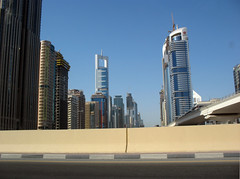I’ve been fortunate in my life to have lived in a few great cities (London, Paris, Hong Kong, Seoul) and travel to many many more. Travel is one of the experiences I value the most for its amazing ability to transform people: by embedding yourself into other cultures, by experiencing other lifestyles, you gain an understanding not only of the rest of the world, but also about yourself and your own culture.
That said, one of the areas of the world that I had been really interested in visiting is the Middle East. It’s a part of the world with a disproportionate influence on our lives, not just because we sent 130,000 troops into Iraq (twice), not just because it’s the source of most of our energy, and not just because it’s people are from a culture fundamentally different from Western liberal democracy… but because of all of these things together. For the forseeable future, the Middle East will be an important focal area of foreign policy for both Europe and America, and so I wanted to see it.
Luckily for me, I work in an international company with a global customer base and was able to attend an “advisory board” meeting in Dubai with a mixture of customers from all over the Middle East. That meeting, in and of itself, was a great cultural experience.
The Middle East is in many ways even more disparate than Africa, there are super-rich countries (like Saudi Arabia) sharing borders with some of the poorest (like Yemen), there are creative city-states like the Emirates of the UAE, there are petro-states like Kuwait, large populous theocracies (Iran), small diverse democracies (Lebanon), large democracies (Egypt), and traditional monarchies (Jordan).
Unfortunately, we couldn’t hold the meeting in all of them. So we settled on one location: Dubai.
My impression of Dubai from what I’d read was that it was like a cross between Las Vegas (ostentatious) and London (cosmopolitan center of finance): an oasis of glass and steel skyscrapers rising out of the desert, on the shores of the Straits of Hormuz, at the nexus of the busiest (and most strategically important) shipping lane in the world. I came to Dubai expecting ostentatious displays of wealth, a mixture of the super-new and the ancient.
And that’s exactly what Dubai is. With an emphasis on “new”.
You can tell from the airport. It’s appointed in marble, it gleams, and it’s packed with luxury stores selling only the most expensive goods. Air conditioning is ubiquitous and sophisticated. White-clad men and black-robed women in traditional dress are scattered among the uniformed employees. So many uniforms.
The retail clerks have a uniform, airport ground staff another, then there’s the guards (all mustached and sporting berets), the bored-looking border agent who stamped my passport wore a traditional white outfit, as did all of the border agents. The taxi drivers dress in business casual, most of them wear ties. The taxis are all high-end Toyotas, Lexuses, or (for those important enough) Mercedes, Bentleys, and other luxury car brands.
You can tell Dubai is new from the placement of the airport. It’s right in the middle of the city. They planned it that way. It took ten minutes to drive to my hotel (the Sheraton Creek Hotel, considered one of the lesser of the five-stars, it would have been the top hotel in many other cities). On the way I passed an enormous construction site. Then I realized that it was just Dubai.
The entire city is under construction. The entire skyline is skyscrapers in various stages of completion. Wikipedia told me that 22% of their GDP is from construction. It also told me that 40% of the population was Indian and 15% was Pakistani (all guests, not citizens). My taxi drive confirmed this. As did the next five I asked.
 The taxi sped along a six lane road through the middle of Dubai. I was in a canyon of skyscrapers the whole way. It was, for lack of a better word, impressive. Most impressive. Dubai is impressive in the way that Hong Kong is impressive, as a feat of engineering. You look at it and say, “Wow. How the hell did they do that.” In Dubai’s case, you also can’t help but wonder, “And WHY did they do that?”
The taxi sped along a six lane road through the middle of Dubai. I was in a canyon of skyscrapers the whole way. It was, for lack of a better word, impressive. Most impressive. Dubai is impressive in the way that Hong Kong is impressive, as a feat of engineering. You look at it and say, “Wow. How the hell did they do that.” In Dubai’s case, you also can’t help but wonder, “And WHY did they do that?”
But that’s a topic for another post.

1 Comment
Comments are closed.